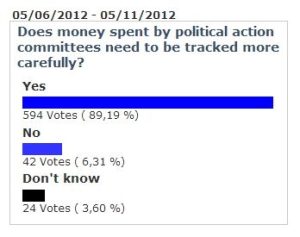Sonora, CA – A recent myMotherLode poll, “Does money spent by political action committees need to be tracked more carefully?” recieved an overwhelming 89% in favor.
According to the Federal Election Campaign Act, an organization becomes a political action committee (PAC) when it receives or spends more than $1,000 for the purpose of influencing a federal election. At the state level, an organization becomes a PAC according to the state’s election laws.
In the 5-4 decision by the supreme court on Citizens United v. Federal Election Commission in 2010, the U.S. Supreme Court ruled that corporations and unions have the same political speech rights as individuals under the First Amendment.
The Court held that the “government may not suppress political speech on the basis of the speaker’s corporate identity. No sufficient governmental interest justifies limits on the political speech of nonprofit or for-profit corporations.”
Additionally, in an 8-1 decision, the Court ruled that the disclaimer and disclosure requirements associated with electioneering communications are constitutional.
Supreme Court Justice Clarence Thomas voiced his dissent to disclosure requirements in the ruling. He sited several examples where contributers to California’s Proposition 8 (eliminated the rights of same-sex couples to marry) were harassed, threatened, their businesses boycotted, or individuals lost their job or resigned after it was disclosed that they made a contribution.
Thomas stated that intimidation tactics toward donors “apparently spawned a cottage industry that uses forcibly disclosed donor information to pre-empt citizens’ exercise of their First Amendment rights.”
Nonprofit, tax-exempt groups known as 501(c) are not legally required to disclose any information about their donors.
According to the Associated press spending by Restore Our Future, a pro-Romney super PAC founded by a team of his former aides, spent $36 million out of the $100 million total that was spent on ads during the republican primary.


